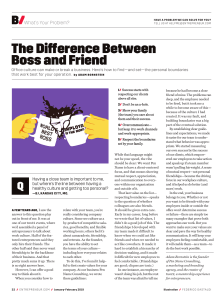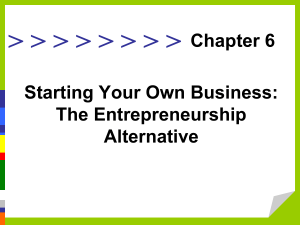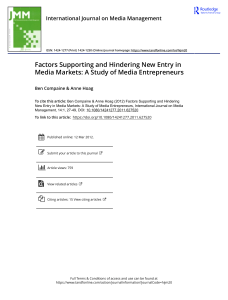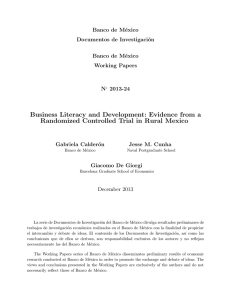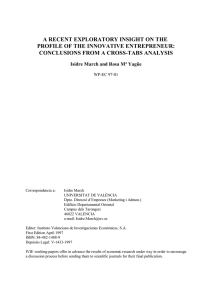Entrepreneurship in the City of Madrid: Myths and Realities
Anuncio
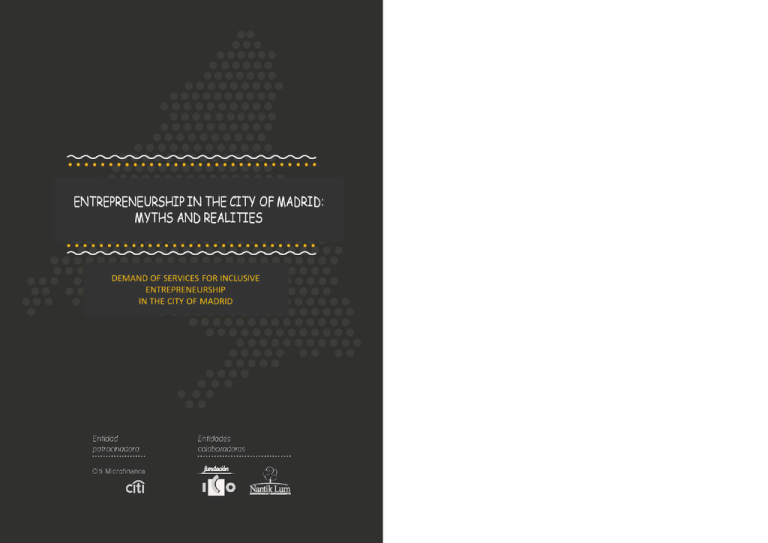
138 DEMANDA DE SERVICIOS PARA EL EMPRENDIMIENTO INCLUSIVO EN LA CIUDAD DE MADRID -9SPONSOR´S FOREWORD EXECUTIVE SUMMARY Bill Van Dyke Bob Annibale Country Officer of Citi in Spain Global Director of Citi Microfinance and Citi Community Development * SPONSOR FOREWORD The 471,354 micro and small enterprises operating in Madrid represent more than 95% of the city’s businesses and employ the majority of the city’s workforce. But the objective of this report is to look beyond the topline number and propose a business segmentation of existing entrepreneurs, analysing their different profile and characteristics to better serve their needs and expectations. There is a mighty economic story at play: the economic potential of micro businesses as a sustainable solution to job creation and equitable growth in urban communities. Madrid, and most other major cities around the world, increasingly recognize the importance of advancing financial and nonfinancial resources that match the needs of a diverse group of entrepreneurs. For example, strengthening dedicated policies and organisations for youth, women and non-national immigrant entrepreneurs can constitute an important driver of job opportunities for parts of the population that are most vulnerable to economic crises and traditionally have limited access to financial services. Across population groups, access to appropriate funding remains one of the important challenges but reducing the administrative costs to launching and operating a company would also be a boon. This report highlights the variety of programs and resources for the entrepreneur community in Madrid at the local, national and European levels. Based on the entrepreneurs’ feedback and usage of these services, it also proposes some opportunities for development and consolidation. Cooperation between public administration, private institutions and civil society is crucial to create a supportive environment for micro and small enterprises. We hope the recommendations provided by Nantik Lum will help to expand these partnerships to unlock the full economic potential of entrepreneurs – for themselves and their cities - and ensure self-employment delivers on the individual promise of financial empowerment and inclusion to the broadest swath of the population possible. About Citi Citi, the leading global bank, has approximately 200 million customer accounts and does business in more than 160 countries and jurisdictions. Citi provides consumers, corporations, governments and institutions with a broad range of financial products and services, including consumer banking and credit, corporate and investment banking, securities brokerage, transaction services, and wealth management. Additional information may be found at www.citigroup.com | Twitter: @Citi | YouTube: www. youtube.com/citi | Blog: http://new.citi.com | Facebook: www.facebook.com/citi | LinkedIn: www.linkedin.com/company/citihttp://www.citigroup.com/citi/citiforcities/ About Citi Microfinance Working across Citi’s businesses, product groups and geographies, Citi Microfinance serves more than 100 microfinance institutions (MFIs), networks and investors as clients and partners in over 40 countries with products and services spanning the financial spectrum – from financing, access to capital markets, transaction services and hedging of foreign exchange risk, to credit, savings, remittances and insurance products – to expand access to financial services for the underserved. Additional information may be found at www.citi.com/citi/microfinance. 142 DEMANDA DE SERVICIOS PARA EL EMPRENDIMIENTO INCLUSIVO EN LA CIUDAD DE MADRID 9. DEMANDA DE SERVICIOS PARA EL EMPRENDIMIENTO INCLUSIVO EN LA CIUDAD DE MADRID EXECUTIVE SUMMARY The Main Objective of this study is to analyze the entrepreneurship activity in Madrid, describe the barriers that entrepreneurs face in their development and understand the level of knowledge of all the Help Services offered by Public Administrations and Social Entities that support entrepreneurship. The methodology used was the following: Selection of a poll of 244 Entrepreneurs operating in Madrid. Personal interviews with the entrepreneurs to obtain their opinions and impressions. Identification and analysis of the existing entrepreneurship support services available in Madrid. * Interviews and meetings with public entities that support entrepreneurship. * * * According to recent numbers of the Central Directory of Enterprises in Madrid (DIRCE), on January first 2013 there were 3.142.928 enterprises in Spain, of which 3.139.106 (99,88%) were SMEs (about 0 and 249 salaried). The Community of Madrid with 495.536 enterprises (15,8% of the total in Spain) is positioned as the second Community with the highest number of enterprises in the country after Cataluña. Total number of enterprises according to the number of salaried employees and total percentage in Spain and Madrid. 2012 Spain % Madrid % 0 Salaried 1.680.361 53,5% 284.755 57,5% 1-9 Salaried 1.326.618 42,2% 186.599 37,7% 10-49 Salaried 113.148 3,6% 18.800 3,8% 50-249 Salaried 18.979 0,6% 4.104 0,8% >=250 Salaried 3.822 0,1% 1.278 0,3% 3.142.928 100% 495.536 100% TOTAL Source: National Institute of Statistics ( INE), DIRCE 2013 (numbers from January First 2013) 1. For this study we have considered Social Entities as Associations and Foundations with free services to support entrepreneurship. These types of organisations are known by the name of Entidades Sociales de Apoyo al Microcrédito (ESAM), a term that will be used regularly through this inform. ESAMS are entities that have a large experience with vulnerable collectives constituted by invidious social and financially excluded; these entities support their labor through micro credits. According to DIRCE, the number of Micro Enterprises (from 0 to 9 employees) supposes the biggest business sector, both in Spain (95,7%) and Madrid (95,2%), being the most developed activity in this city. This supports the opinion of experts in the inform GEM Madrid 2012, which affirms that this city is perceived as the most favorable environment for business development, above the Spanish average. The study analyzes a significant sample of entrepreneurs, which reveals different profiles and characteristics. The main study requirement was that all the entrepreneurs have started their business in Madrid. Based on the data collected, 4 (four) different profiles were identified, which could be used as a representative sample: 143 144 DEMANDA DE SERVICIOS PARA EL EMPRENDIMIENTO INCLUSIVO EN LA CIUDAD DE MADRID * Young Entrepreneur (less than 30 years old) This profile is described as a young male (61%) with qualified education (88,9%). Given the crisis, the number of young people who decided to become entrepreneurs has increased, becoming an alternative to the difficulties of formal employment, according to GEM Spain Inform 2012. Young entrepreneurs are characterized by starting businesses with important technology component (32%) and strong intentions of internationalization (55,6%). In terms of barriers, most of them argue that –beside of all the traditional barriers found by entrepreneurs- their biggest difficulties are the lack of adequate formation for entrepreneurship, lack of experience and lack of understanding of entrepreneurship within their closest social groups. The efforts made by Public Administrations to improve young entrepreneurship are visible through specific training programs implemented in schools and universities. Nevertheless there is a pending issue related to creating a strong Institute of Young Entrepreneurship, in which all resources and tools can come together with a focus on new technologies. Mentoring stands as an important tool for starting and consolidating businesses of Young entrepreneurs, this initiative could cover the gap of experience expected from this segment. In reference to new forms of work, coworking spaces are perceived as an opportunity for establishing networks through sharing of experience and knowledge. 38,9% of the entrepreneurs expressed they have used these type of spaces. DEMANDA DE SERVICIOS PARA EL EMPRENDIMIENTO INCLUSIVO EN LA CIUDAD DE MADRID * Women Entrepreneur (gender) A total of 39,8% of the entrepreneurs sampled were women. The average age bracket was women between 31 and 40 years old, around 49,5%, followed by 21,6% of women younger than 30 years old. The business sector where women entrepreneurs are most developed is commerce (26%), although is important to point out that technology sector has an important position with 17%. Women entrepreneurs are also qualified, with 88,7% of them having specific qualified education. Although efforts made by the Public Administrations in Madrid are considered relevant, the number of women entrepreneur suffered a decreased according to the Inform GEM Madrid 2012. Experts affirm that the programs for women entrepreneurs in Madrid have not been successful because they did not take in account the specific needs of these entrepreneurs. This could change by creating specifics organisms (or promoting existing ones such as the Instituto de la Mujer), where all the initiatives and resources aimed to improve women self-employment can be centralized, including the development of specific policies to facilitate job equalities and reduce the lack of access to finance suffered by women entrepreneurs. On the other hand, public administrations could provide more resources and visibility to organizations like ESAMS, given their long history and knowledge of working with this segment of entrepreneurs. In this study, 64,9% of the women decided to look for help for starting their business and the 38,1% of them did it in Associations and Foundations with free services. The rest of the women affirmed that they did not look for any help because they didn’t know it existed. 145 146 DEMANDA DE SERVICIOS PARA EL EMPRENDIMIENTO INCLUSIVO EN LA CIUDAD DE MADRID * Tech entrepreneur (technology sector) A total of 30,3% of entrepreneurs belong to the technology sector, 90,5% of them are Spanish, 78,4% are male, 51,4% are between 31 and 40 years old and 97,3% have a qualified education. The consulted experts and entrepreneurs perceive Madrid as a favorable place for starting a technology business, which require a high level of development and innovation. 46,3% of these entrepreneurs used the services of Madrid Emprende to start their business. Co-working spaces are one of the enterprise development services that has been most used by this segment of entrepreneurs, with 41,9% of them using a co-working space. The internationalization of business activities rise up for this segment of entrepreneur: 60,8% of them affirmed they already started the process of developing their activities outside the Spanish market or have the intentions of doing it. Nevertheless, is important to point out that an 80% consider inadequate the public services provided to increase the internationalization of their businesses. The Technology sector is the most important sector of activities across all segments of entrepreneurs, especially among young entrepreneurs (32%) and women entrepreneurs (17%), therefore, it seems important to improve public resources in this sector, not just because of the impact in the economy, but also for the recent increased of technology enterprises with 75,6% of the businesses having less than two years of operation. DEMANDA DE SERVICIOS PARA EL EMPRENDIMIENTO INCLUSIVO EN LA CIUDAD DE MADRID * Immigrant Entrepreneur (non-national entrepreneur) This profile stands for having a majority of male entrepreneur (60,5%). Regarding their education, 73,7% stated having a qualified education (nearly 15% less than the total sample). The average age bracket was between 31 and 50 years old (76,3%). The most popular business sector developed by immigrants are hospitality and service/commerce sector, both representing 23,7%. The legal form chosen by most of these entrepreneurs was the autonomous juridical status, which in general requires simpler and cheaper processes. The 73,7% of these business have less than 2 years. In general, immigrants are above national average in becoming entrepreneurs. Even if total number of immigrants has been reduced due to Spain’s policy for return migration, a lot of those who decided to stay started their own business. The numbers reveal that 27,3% of immigrants entrepreneurs received support from their families and friends as well as from ESAMS for starting their own business. Once again, we highlight the role that organizations, like ESAMS, play for segment of populations recognized as vulnerable such as women and immigrants. 147 148 DEMANDA DE SERVICIOS PARA EL EMPRENDIMIENTO INCLUSIVO EN LA CIUDAD DE MADRID * Analysis of services available to support entrepreneurship Following a deep analysis of the services available to Madrid entrepreneurs, there are several initiatives we would like to highlight below: Outstanding Initiatives: Public Initiatives: In this field, we highlight the support provided by the Institution Madrid Emprende, which has become an important reference for proposing a wide offer of services to entrepreneurs. Private Initiatives: In the private area, we recognize the work made by Entidades Sociales de Apoyo al Microcrédito (ESAMS), which have a large experience supporting self-employment and working with vulnerable segments of entrepreneurs. * Main Barriers In the study of Entrepreneurship in Spain, the traditional barriers faced by entrepreneurs continue to be highlighted, access to finance (respondents to the survey rated the difficulty to access finance at 3,7 out of 5 ), costs of a new enterprise (3,9 out of 5) and the excess of bureaucracy in Public Administrations (3,5 out of 5). However it was shown that these barriers are perceived differently depending on each entrepreneur segment, which lead to think that public administrations will have to adapt their tools according to the different segments of entrepreneurs they are targeting. DEMANDA DE SERVICIOS PARA EL EMPRENDIMIENTO INCLUSIVO EN LA CIUDAD DE MADRID * Recommendations Madrid Emprende is a reference in the public sector for entrepreneurship, but this perception is not always shared by the entrepreneurs themselves, which sometimes perceive it as opaque and distant. The services offer by Madrid Emprende and other public administrations are often unclear and confusing for the beneficiaries. It can be a good recommendation to provide clear and customized information based on each entrepreneur’s profile. We recommend to improve access to finance through microcredit programs, which have been recognized as an appropriate tool to cover the financial needs of the different segments of entrepreneurs, and promote their social and financial inclusion. We recommend to decrease taxes and promote exemption measures during the first year of new businesses, which have been completed in other countries and will stimulate entrepreneurship in Madrid. Organizations like ESAMS could perform an important role by canalizing all the measures provided by the public administrations, such as advising on access to funding and microcredits, given their extensive knowledge of the most vulnerable entrepreneur’s needs. It would be appropriate to promote additional mentoring programs as an efficient measure to stimulate young entrepreneurs. Given the increased demand of coworking spaces, we recommend to increase resources available for these structures, as well as the training and networking services provided, which are highly rated by entrepreneurs. 149 EL EMPRENDIMIENTO EN MADRID: MITOS Y REALIDADES DEMANDA DE SERVICIOS PARA EL EMPRENDIMIENTO INCLUSIVO EN LA CIUDAD DE MADRID
